最新人教版新目标英语七下《Unit 2 Section A (Grammar Focus-3c)第二课时教学设计及教学反思》精品教案
人教版英语七年级下册Unit2:SectionA(Grammar _Focus-3c)精品教案
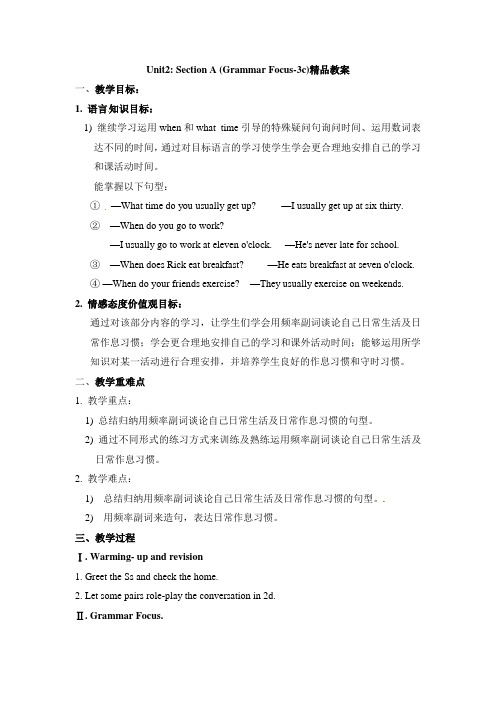
Unit2: Section A (Grammar Focus-3c)精品教案一、教学目标:1. 语言知识目标:1) 继续学习运用when和what time引导的特殊疑问句询问时间、运用数词表达不同的时间,通过对目标语言的学习使学生学会更合理地安排自己的学习和课活动时间。
能掌握以下句型:①—What time do you usually get up? —I usually get up at six thirty.②—When do you go to work?—I usually go to work at eleven o'clock. —He's never late for school.③—When does Rick eat breakfast? —He eats breakfast at seven o'clock.④—When do your friends exercise? —They usually exercise on weekends.2. 情感态度价值观目标:通过对该部分内容的学习,让学生们学会用频率副词谈论自己日常生活及日常作息习惯;学会更合理地安排自己的学习和课外活动时间;能够运用所学知识对某一活动进行合理安排,并培养学生良好的作息习惯和守时习惯。
二、教学重难点1. 教学重点:1) 总结归纳用频率副词谈论自己日常生活及日常作息习惯的句型。
2) 通过不同形式的练习方式来训练及熟练运用频率副词谈论自己日常生活及日常作息习惯。
2. 教学难点:1) 总结归纳用频率副词谈论自己日常生活及日常作息习惯的句型。
2) 用频率副词来造句,表达日常作息习惯。
三、教学过程Ⅰ. Warming- up and revision1. Greet the Ss and check the home.2. Let some pairs role-play the conversation in 2d.Ⅱ. Grammar Focus.1. 下面是对用频率副词谈论自己日常生活及日常作息习惯的句型进行了总结。
人教版七年级英语下册 Unit2 Section A period 2 Section A (Grammar Focus-3c) 教案
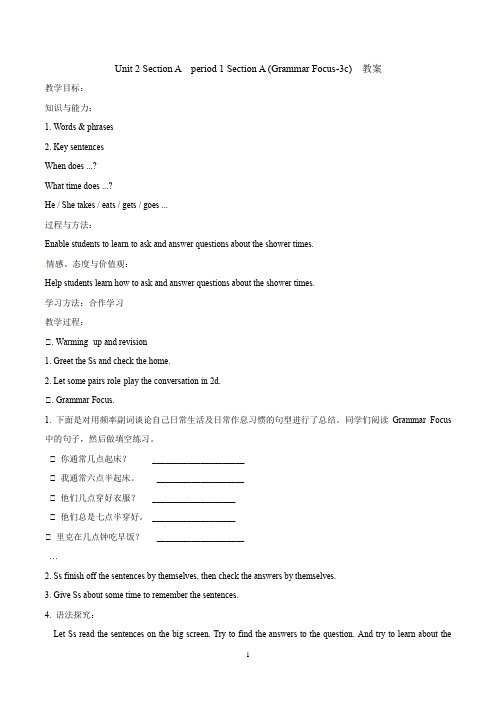
Unit2 Section A period 1 Section A (Grammar Focus-3c) 教案教学目标:知识与能力:1. Words&phrases2. Key sentencesWhen does ...?What time does ...?He / She takes / eats / gets / goes ...过程与方法:Enable students to learn to ask and answer questions about the shower times.情感、态度与价值观:Help students learn how to ask and answer questions about the shower times.学习方法:合作学习教学过程:Ⅰ. Warming- up and revision1. Greet the Ss and check the home.2. Let some pairs role-play the conversation in 2d.Ⅱ. Grammar Focus.1. 下面是对用频率副词谈论自己日常生活及日常作息习惯的句型进行了总结。
同学们阅读Grammar Focus 中的句子,然后做填空练习。
①你通常几点起床?_____________________②我通常六点半起床。
____________________③他们几点穿好衣服?___________________④他们总是七点半穿好。
___________________⑤里克在几点钟吃早饭?____________________…2. Ss finish off the sentences by themselves, then check the answers by themselves.3. Give Ss about some time to remember the sentences.4. 语法探究:Let Ss read the sentences on the big screen. Try to find the answers to the question. And try to learn about thegrammar knowledge.①可以看出,询问做某事的时间时,可以用_____________和_______ 两个疑问词来询问。
人教版七年级英语下 Unit 2Section A Grammar Focus -3C(共25张PPT)

3a
Write answers or questions. Use always, usually or never.
1. What time do you get up __________________ on school days? I_____________________________________ usually get up at 5:30 on school days. 2. What ____________________________? time does Rick get up Rick always gets up at 6:20. 3. What time do you have breakfast? I usually have breakfast at 6:30. ________________________________ 4. __________________________________? What time does Anna eat breakfast Anna never eats breakfast. 5. What time does your best friend go to school? ___________ __________________________________ She/He always goes to school at 7:00.
三、翻译下列句子。 1.你通常几点钟起床? What time do you usually get up? 2. 我通常8点起床。 I usually get up at 8:00. 3. 你的朋友们通常几点打篮球? What time do your friends play basketball? 4. 他们通常2点打篮球。 They usually play basketball at 2 o’clock. 5. 我从不迟到。 I’m never late.
人教版初中英语七年级下册Unit2SectionAGrammar~3c教学设计

4.教师通过讲解、示范、练习等方式,帮助学生掌握本节课的新知识点。
(三)学生小组讨论
1.教师将学生分成若干小组,每组四人,确保每个学生都能参与到讨论中来。
2.教师给出一个话题,如“描述你们组员在课间的活动”,要求学生运用现在进行时态和频率副词进行描述。
3.学生在小组内进行讨论,互相启发、补充,共同完成任务。
4.各小组派代表展示讨论成果,教师对每个小组的表现进行点评,给予鼓励和指导。
(四)课堂练习
1.教师设计不同类型的练习题,如填空、选择、改错等,让学生在课堂上进行巩固练习。
2.练习题涉及本节课的重点知识点,旨在检测学生对现在进行时态和频率副词的掌握程度。
3.教师在布置作业时,要明确作业要求,提醒学生注意语法和词汇的正确运用。
4.鼓励学生在完成作业过程中,充分利用学习资源,发挥自主学习能力,提高英语素养。
4.能够根据所给提示,编写简单的句子和对话,运用所学时态进行表达。
5.提高听力理解能力,能从听力材料中捕捉关键信息,理解并运用所学时态。
(二)过程与方法
在本章节的学习过程中,学生将通过以下方法提升学习效果:
1.采用任务型教学法,引导学生通过观察、思考、讨论、实践等环节,自主探究语法知识。
2.利用情景教学法,创设真实语境,让学生在实际语境中运用所学时态,提高语言表达能力。
四、教学内容与过程
(一)导入新课
1.教师播放一段学生在课堂上的动画视频,视频中展示了同学们在课堂上进行各种活动的场景,如认真听讲、积极发言、小组讨论等。
2.视频播放完毕后,教师邀请学生关注视频中人物的动作和状态,并提出问题:“Can you tell me what the children are doing now?”引导学生运用现在进行时态进行回答。
人教版七年级英语下册 Unit 2 Section A (Grammar focus-3c) 课件

3. never _I_n__ev_e_r__e_x_er_c_i_se__in__t_h_e_e_v_e_n_i_n_g_s_. _______
1. What time do you get up on school days? 2. Rick always gets up at 6:20. 3. Anna never eats breakfast. 4. I usually get up at…o’clock. get up on weekends, exercise, eat dinner, take a shower, go to school
对做某事的具体时间点进行询问时,when 和what time均可用。 — What time/When do you go to
school? — I go to school at half past six.
对钟表显示的具体时间进行询问时,即询 问几点几分时,只能用what time。 — What time is it now? — It’s seven twenty. 对事情发生的年份、月份、日期以 及上午、下午或晚上等非钟点性时间询问 时,只能用when。 — When did the story happen? — On the morning of March 18, 2017.
3. To learn new words: on weekends, best, group
ADຫໍສະໝຸດ go to schoolB
brush teeth E
Unit 2 Section A Grammarfocus-3c教案人教版七年级下册英语
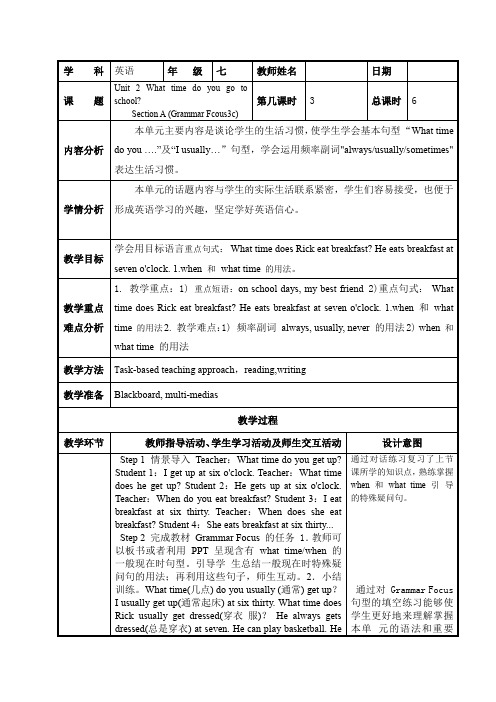
英语
年 级
七
教师姓名
日期
课题
Unit 2 What time do you go to school?
Section A (Grammar Fcous3c)
第几课时
3
总课时
6
内容分析
本单元主要内容是谈论学生的生活习惯,使学生学会基本句型“What time do you ….”及“I usually…”句型,学会运用频率副词"always/usually/sometimes"表达生活习惯。
通过对话练习复习了上节课所学的知识点,熟练掌握when和what time引导的特殊疑问句。
通过对 Grammar Focus 句型的填空练习能够使学生更好地来理解掌握本单 元的语法和重要句型。
在这个环节中,既有口语对话练习,又有写作练习,对学生的口语表达和写作都有提高。
课堂me does Rick eat breakfast? He eats breakfast at seven o'clock..”。
Step 2完成教材Grammar Focus的任务 1.教师可以板书或者利用PPT呈现含有what time/when的一般现在时句型。引导学生总结一般现在时特殊疑问句的用法;再利用这些句子,师生互动。2.小结训练。What time(几点) do you usually (通常) get up?I usually get up(通常起床) at six thirty. What time does Rick usually get dressed(穿衣服)?He always gets dressed(总是穿衣) at seven. He can play basketball. Hecan't(不能) play basketball. When does(几点) Scott go to work (去上班)?He usually goes to work at eight o'clock. He is never late(从不迟到). When does(几点)your friends exercise?They exercise at nine(在九点).
人教版英语七下Unit 2 Section A(Grammar Focus-3c)新版课件

Student 2 Student 3 Name:____ Name:____
In our group, Li Fei usually gets up late on weekends. She gets up at…
eat dinner
Student 1 Student 2 Student 3 Name:___ Name:____ Name:____
2. 频度副词在句中的位置
➢ 频度副词通常位于be动词、助动词、情态动词之后, 实义动词之前。 其中,sometimes可以放在句首、 句中或句末。 例:她并不经常锻炼。 She _d_o_e_s_n_’_t_ __o_f_t_e_n_ do exercise. 我通常9点半洗淋浴。 I __u_su__a_ll_y_ ___ta_k_e__ a shower at nine thirty.
3. What time do you have breakfast? _I_u_s_u_a_ll_y_h__a_v_e_b_r_e_a_k_f_a_st__a_t _7_:0_0_.______________
4. _W__h_a_t_t_im__e_d_o_e_s_A__n_n_a__u_su__a_ll_y_e_a_t_b_r_e_a_k_f_a_s_t ____? Anna never eats breakfast.
take a shower
go to school
What time does Bob usually ___________?
He usualபைடு நூலகம்y _____________.
Grammar Focus
What time do you usually get up?
人教版英语七年级下册 Unit2 SectionA grammar 课件

14
What time do you usually …? I usually … at …
get up
run
15
What time do you usually …? I usually … at …
eat breakfast
take a shower
16
• What time do you get up?
• I get up at six o’clock.
Grammar Focus
- What time does he eat breakfast?
• He eats breakfast at seven o’clock.
- What time does she go to school? • She goes to school at eight o’clock.
17
重点句型:
1、What time do you get up?(they) I /we usually get up at 6:15. (三单) What time does he brush his teeth? He brushes his teeth at 6:30 am.
What time does she do her homework? She does her homework at 6:30 pm.
18
重点句型:
2/---What time do you get up? ---I usually get up at 6:15. ---What time does he brush his teeth? ---He brushes his teeth at 6:30.
七年级英语下册Unit2课时2SectionAGrammarFocus_3c课件pptx人教新目标版

一
二
三
四
3. Who is your best (good) friend in your class? 4. When does the boy get (get) dressed? 5. Ann never plays (play) computer games at school.
一
二
三
四
exercise, work, she, shower, get,never, early, class, music, always
21. Her
students love her. They say she is
22. always kind and teaches them very well. Miss Zhang has
school.
A. never; for
B. never; to
C. always; for
D. always; to
一
二
三
四
( D )13. He
the first class at 8:00 in the morning.
A. usually have
B. have usually
C. has usually
一
二
三
四
exercise, work, she, shower, get,never, early, class, music, always
Miss Zhang is busy every day. She is an English teacher. She
16. works very long hours every day. She gets up 17. early in the morning. She 18. exercises at 6:15.
初中英语人教版七年级下册unit2.grammar-focus
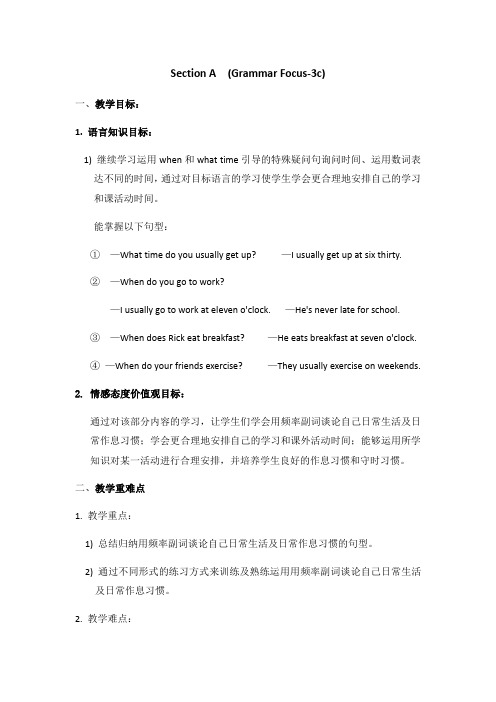
Section A (Grammar Focus-3c)一、教学目标:1. 语言知识目标:1) 继续学习运用when和what time引导的特殊疑问句询问时间、运用数词表达不同的时间,通过对目标语言的学习使学生学会更合理地安排自己的学习和课活动时间。
能掌握以下句型:①—What time do you usually get up? —I usually get up at six thirty.②—When do you go to work?—I usually go to work at eleven o'clock. —He's never late for school.③—When does Rick eat breakfast? —He eats breakfast at seven o'clock.④—When do your friends exercise? —They usually exercise on weekends.2. 情感态度价值观目标:通过对该部分内容的学习,让学生们学会用频率副词谈论自己日常生活及日常作息习惯;学会更合理地安排自己的学习和课外活动时间;能够运用所学知识对某一活动进行合理安排,并培养学生良好的作息习惯和守时习惯。
二、教学重难点1. 教学重点:1) 总结归纳用频率副词谈论自己日常生活及日常作息习惯的句型。
2) 通过不同形式的练习方式来训练及熟练运用用频率副词谈论自己日常生活及日常作息习惯。
2. 教学难点:1) 总结归纳用频率副词谈论自己日常生活及日常作息习惯的句型。
2) 用频率副词来造句,表达日常作息习惯。
三、教学过程Ⅰ. Warming- up and revision1. Greet the Ss and check the home.2. Let some pairs role-play the conversation in 2d.Ⅱ. Grammar Focus.1. 下面是对用频率副词谈论自己日常生活及日常作息习惯的句型进行了总结。
七年级-人教版-英语-下册-Unit-2-Section-A-(Grammar-Focus-3c)

二、频度副词
助记
always
usually
often
sometimes hardly (几乎不) never
二、频度副词
典例
I ____D____ ride a bike to school. But this morning, I walked to school. A.never B.hardly C.always D.usually
Words and expressions
_o_n__w_e_e_k_e_n_d_s__ (在)周末 ______b_e_st_____ adj. 最好的 adv. 最好地;最 _____g_r_o_u_p____ n. 组;群
Grammar
1.what time 和 when what time 用于询问具体的时间点;when 既可以用来询问年、 月、日等,也可以询问具体时间点。
Unit 2 What time do you go to school? (Period 2)
Section A (Grammar Focus-3c)
Ask and answer.
What time do you usually …?
get up
go to school
get dressed
Ask and answer.
一、what time 和 when
典例
—____A____, please? —I think it’s about 5:30.
A.What time is it
B.What the time
C.When it is
D.When the time
点拨
可用语法判断法解答本题。what time 询问具体时间点, when 可以询问年、月、日等,也可询问具体时间点。分析选项 可知B、D结构不对,C语序不对。故选A。
最新人教版七年级下册英语Unit 2 Section A (Grammar Focus-3c)
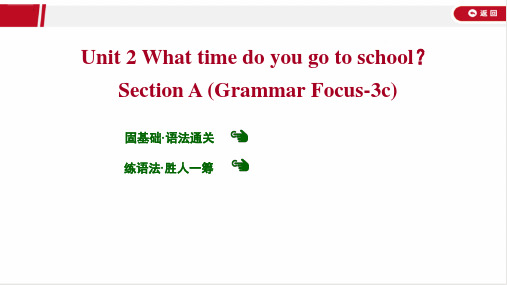
Ⅱ 单项选择
( B )1. My father likes sports. He often
in the morning.
A. ran
B. runs
C. will run
D. has run
( B )2. —What do you often do on weekends?
—I
to the theatre to see the Beijing Opera with my grandpa.
A. Always
B. Sometimes
C. Seldom
D. Never
Unit 2 What time do you go to school? Section A (Grammar Focus-3c)
固基础·语法通关 练语法·胜人一筹
固基础·语法通关
一 一般现在时 1. 概述
一般现在时表示经常性、习惯性的动作, 也用来表达客观事实及客观真理。 一般现在时包含be动词的一般现在时和实义动词的一般现在时两种情况, 在这 里我们主要讲述含有实义动词的一般现在时。 2. 谓语动词的形式
图增学趣
名师授道
多学一点 对频率副词提问要用how often。 —How often do you exercise? ——你多久锻炼一次? —I often exercise. ——我经常锻炼。
练语法·胜人一筹
【语法通关】 Ⅰ用所给词的适当形式填空 1. My mother always _g_o_e_s(go) to bed early. 2. Tom and his brother usually _s_tu_d_y_(study) in the library. 3. _D_o_e_s_ your English teacher _w_e_a_r_(wear) glasses? 4. Jack _d_o_e_sn_’_t_d_o_(not do) his homework before dinner. 5. It often _r_a_in_s_(rain) here in summer.
人教7下Unit2SectionA2(GrammarFocus3c)教学设计
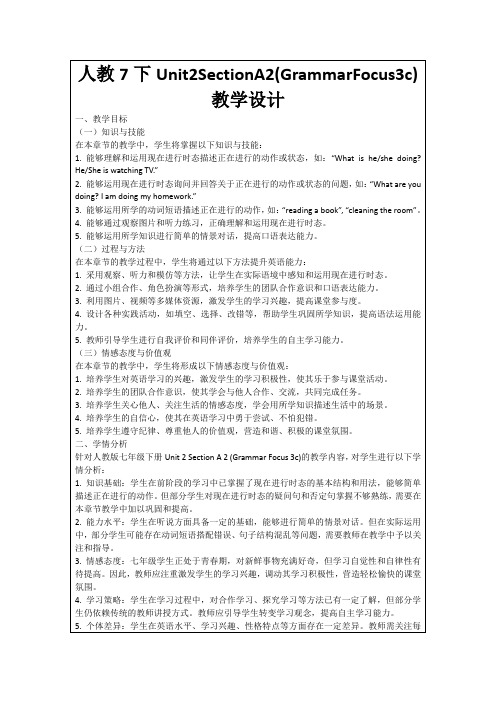
1.教师将学生分成小组,每组根据提供的图片和关键词,讨论如何用现在进行时态描述场景。
2.各小组展示讨论成果,其他小组进行评价和反馈。
3.教师对每个小组的表现进行点评,强调语法点和动词短语的正确运用。
(四)课堂练习(500字)
1.教师发放练习册,要求学生在规定时间内完成与现在进行时态相关的练习题,如填空、选择、改错等。
-结合合作学习法和探究学习法,培养学生的团队协作能力和自主学习能力。
2.教学过程:
-导入:通过展示与现在进行时态相关的图片,引导学生复习相关语法知识,为新课的学习做好铺垫。
-呈现:教师呈现本节课的重点句型,并结合图片、动作进行讲解,帮助学生理解和记忆。
-练习:设计各种形式的练习,如填空、选择、改错等,让学生巩固所学知识,提高语法运用能力。
3.教师总结学生的回答,引出现在进行时态的主题,为新课的学习做好铺垫。
(二)讲授新知(500字)
1.教师呈现现在进行时态的肯定句、疑问句和否定句结构,并通过图片、动作进行讲解。
-肯定句:主语+ be动词(am/is/are) +动词ing形式+其他。
-疑问句:Be动词(am/is/are) +主语+动词ing形式+其他?
1.知识基础:学生在前阶段的学习中已掌握了现在进行时态的基本结构和用法,能够简单描述正在进行的动作。但部分学生对现在进行时态的疑问句和否定句掌握不够熟练,需要在本章节教学中加以巩固和提高。
2.能力水平:学生在听说方面具备一定的基础,能够进行简单的情景对话。但在实际运用中,部分学生可能存在动词短语搭配错误、句子结构混乱等问题,需要教师在教学中予以关注和指导。
(新)人教七年级下 Unit 2 课时2(A Grammar focus-3c)

Section A Grammar focus-3c
R·七年级下册
New words and phrases
on weekends best group
〔在〕周末 adj.最好的 adv.最好地;最 n.组;群
Let’s read
group
Lead in
Jack’s Day
I have a pen pal, Jack. Shall we come to see his daily activities?
7:50 a.m. 7:00 a.m.
12:00 a.m.
a. get up
b. go home
Try to match the
They usually exercise on
weekends.
频度副词用来表示做 某事的频率。他们和 动词的位置有何关系?
when & what time 引导的特殊疑问句
➢ when 和 what time 都可以用来询问时间,二 者在使用时要注意以下几点:
➢ 询问做某事的具体时刻〔钟点〕时,两者可以 互换使用。如:
Grammar Focus
What time do you usually get up?
I usually get up at six thirty.
What time do they get They always get dressed at
dressed?
seven twenty.
What time does Rick eat He eats breakfast at seven
2. _W__h_a_t_t_im__e_d_o_e_s_R__ic_k__a_lw__a_y_s_g_e_t_u_p___________? Rick always gets up at 6:20.
人教新目标七年级英语下册Unit 2 Section A Grammar focus--3c课件(共21张PPT) (1)
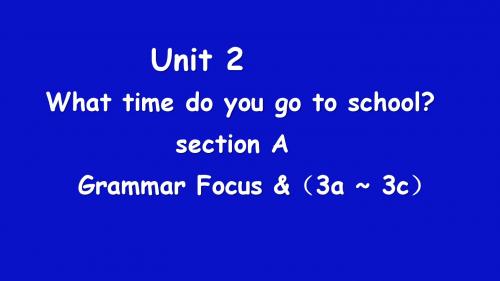
go to school
do homework
take a shower
go to bed
Talk about thing you always do, something you usually do, something you never do.
S1: I always… I usually… I never… S2: I always… I usually… I never… S3: I always… I usually… I never… S4: I always… I usually… I never…
Unit 2
What time do you go to school?
section A
Grammar Focus &(3a ~ 3c)
Review
What time is it?
What’s the time ?
get up
eat breakfast
brush teeth
get dressed
用括号内所给动词的适当形式填。
• (1)—What time do (do)they get up ? • —They get up(get up)at five o’clock. • (2)—What time does(do)Tom take (take) a
• shower? • —He takes (take)a shower at 7:15. • (3)—What time do you go to school? • —I
Grammar Focus
- What time do you usually get up? - I usually get up at six thirty. -What time do they get dressed? -They always get dressed at seven twenty. - What time does Rick eat breakfast? - He eats breakfast at seven o’clock. -When does Scott go to work? -He always goes to work at eleven o’clock. -He’s never late. - When do your friends exercise? - They usually exercise on weekends.
人教版七年级下册Unit 2 Section A --Grammar focus(共17张PPT)

Grammar 1
频度副词位置
➢ 位于系动词、助动词、情态动词之后,行为动词之前。
① 在系动词之后。 She is sometimes very busy.
② 在第一个助动词或情态动词之后。 I will never forget this lesson.
③ 在实义动词之前。 We often go there.
词汇篇
Section A
单词
brush
刷;刷净
v.
扩展
词组
刷牙 刷盘子
她每天早上都刷牙。
She brushes her teeth every day.
例句
单词
exercise
锻炼;练习
v.
扩展
词组
做早操 拼写练习
我通常在大约十点二十锻炼。
I usually exercise at about ten twenty.
He usually takes a walk at half past seven in the morning.
例句
单词
quickly
很快地
adv.
扩展
词组
① 跑的快 ② 吃的快
这个兔子跑的真快! The rabbit runs too quickly.
例句
谢谢大家
他们是一群超人。 They are a group of supermen.
例句
单词
walk
行走;步行
n.
扩展
词组
去散步
他通常早上去散步。
He usually takes a walk in the morning.
例句
单词
past
英语 七年级下册人教版 Unit2 Section A Grammer focus---3c 课件

When do your friends exercise? They usually exercise on weekends.
Step1 :知识回顾---环节二:教师点评
Question 1:when 和 what time 区别
what time和when都是就时间提 问,它们的回答有何异同?
What time does Rick eat breakfast?
He eats breakfast at seven o’clock.
When does Scott go to work?
He always goes to work at eleven o’clock. He’s never late.
Step2 :题型讲解---环节二:教师归纳
2. In our group, Li Fei usually gets up late on weekends. 在我们组,李菲在周末通常起床晚。 group n. 组;群
Step1 :知识回顾---环节二:教师点评
Question 3:单数第三人称作主语时的助动 词形式
在特殊疑问句中,单 数第三人称(he, she)和 其他人称在动词形式 上有什么差异?
在问句中,单数 第三人称前用助 动词does,其他 人称用do。
Step2 :题型讲解---环节一:师友互讲
3a Write answers or questions. Use always, usually or never.
always ________________________________
usually ________________________________ ________________________________
- 1、下载文档前请自行甄别文档内容的完整性,平台不提供额外的编辑、内容补充、找答案等附加服务。
- 2、"仅部分预览"的文档,不可在线预览部分如存在完整性等问题,可反馈申请退款(可完整预览的文档不适用该条件!)。
- 3、如文档侵犯您的权益,请联系客服反馈,我们会尽快为您处理(人工客服工作时间:9:00-18:30)。
前言:
该教学设计(教案)由多位一线国家特级教师根据最新课程标准的要求和教学对象的特点结合教材实际精心编辑而成。
实用性强。
高质量的教学设计(教案)是高效课堂的前提和保障。
(最新精品教学设计)
Unit 2What time do you go to school?
第二课时Section A (Grammar Focus-3c)
Target Navigation【目标导航】
Key words and phrases:
best,group,on weekends
Key sentences:
(1)—What time do you usually get up?
—I usually get up at six thirty.
(2)—What time do they get dressed?
—They always get dressed at seven twenty.
(3)—What time does Rick eat breakfast?
—He eats breakfast at seven thirty.
(4)—When does Scott go to work?
—He always goes to work at eleven o'clock.
(5)—When do your friends exercise?
—They usually exercise on weekends.
Skills:进一步掌握what time和when引导的疑问句。
Emotion:能听懂听力并能根据听力对话进行自由交际,培养学生学会常规管理。
The guidance of learning methods【学法指导】
把握学习的主要内容,在学习中善于记要点,善于抓住用英语进行交际的机会。
Learning important and difficult points【学习重难点】
1.进一步掌握what time和when引导的疑问句。
